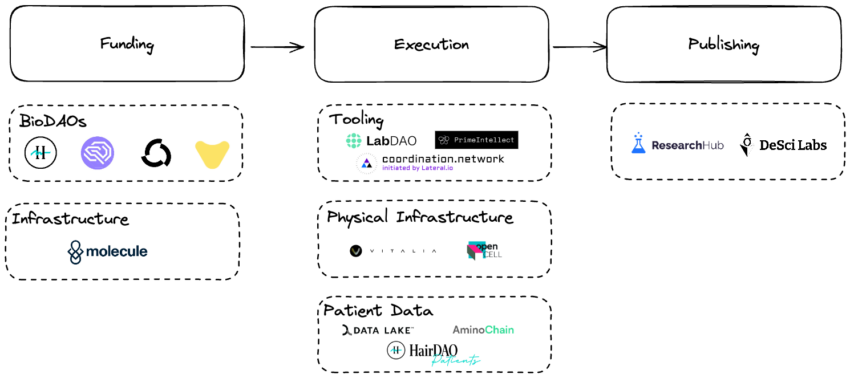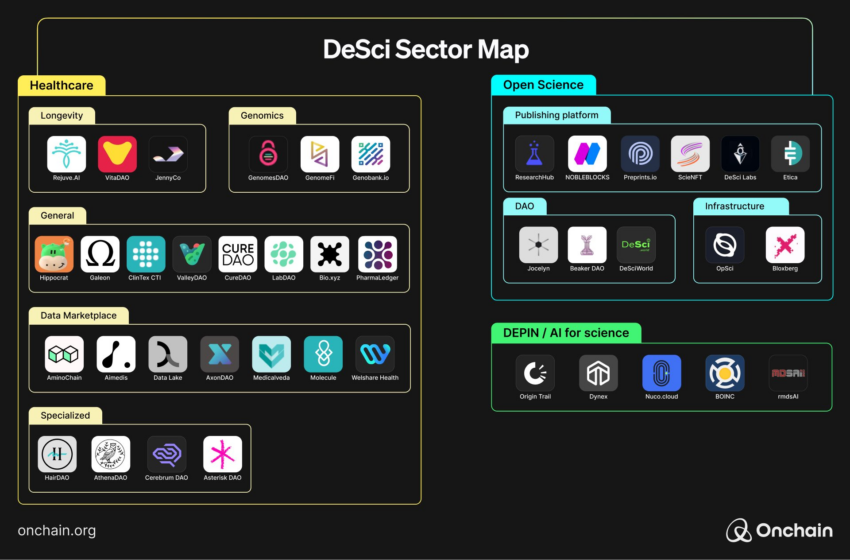Decentralized Science (DeSci): Future of Research Powered by Blockchain
The intersection of science and blockchain technology is transforming the way research is funded, conducted, and shared. This emerging movement, known as Decentralized Science (DeSci), aims to solve some of the most occurring problems in traditional research systems—limited funding, restricted access, and lack of transparency—by leveraging decentralized networks and token-based economies.
In this article, we explore what DeSci is and highlight some of the most prominent projects leading the charge.
What is DeSci?DeSci is a movement that applies blockchain principles to revolutionize the scientific research landscape. By creating decentralized platforms, DeSci enables open access to data, transparent funding mechanisms, and global collaboration among scientists, investors, and enthusiasts.
 The DeSci value chain (2024). Source: Patrick Mayr
The DeSci value chain (2024). Source: Patrick Mayr
At its core, DeSci seeks to:
- Democratize funding: Allow researchers to secure funding directly from global communities instead of relying on slow, bureaucratic grant systems.
- Enhance collaboration: Break down institutional silos and foster open-source partnerships across disciplines and geographies.
- Ensure transparency: Use blockchain for immutable record-keeping of research outcomes, consents of patient recruitment, and other crucial records to ensure integrity and trust.
Unlike traditional systems that are often burdened with inefficiencies, Decentralized Science empowers individuals—be they patients, donors, or researchers—to actively shape the direction of scientific discovery.
Key Players in the DeSci Ecosystem DeSci Sector Map. Source: Onchain Foundation
DeSci Sector Map. Source: Onchain Foundation
DeSci has attracted a growing number of innovators who are building decentralized platforms to address specific research challenges. Here are some of the most notable projects:
- VitaDAO
VitaDAO is a decentralized collective that focuses on advancing research in human longevity. Members pool resources to fund groundbreaking studies in aging and longevity science, and they collectively govern which projects receive support. Indeed, this DAO structure democratizes decision-making, ensuring research aligns with the community’s interests.
- Molecule
Molecule connects researchers with decentralized funding through a marketplace where intellectual property (IP) can be tokenized. This system enables researchers to receive upfront funding while allowing investors to hold stakes in the potential success of the projects.
- Data Lake
Data Lake stands out for its focus on healthcare and medical research. Using the Data Lake Chain, the platform allows patients to securely donate their medical data for research purposes through a transparent, blockchain-based consent system. Moreover, its native token, LAKE, functions as a gas token, access token, and rewards token, ensuring alignment among all stakeholders.
- ResearchHub
Often referred to as the “GitHub for Science,” ResearchHub incentivizes researchers to share their work and collaborate through a token economy. Contributors earn ResearchCoin (RSC) for their efforts, fostering a decentralized, user-driven ecosystem for scientific knowledge exchange.
- BiohackerDAO
BiohackerDAO is a community-driven organization supporting biohacking and citizen science initiatives. It promotes open-access research and enables individuals to contribute to and benefit from DIY biology and genetic exploration breakthroughs.
- DeSci World
DeSci World serves as a hub for the broader DeSci community, offering resources, events, and a directory of active projects. It acts as a gateway for newcomers and seasoned participants to engage with the movement.
Why DeSci MattersTraditional scientific systems often fall short in addressing the challenges of modern research:
- Limited Funding: Researchers rely on grants that are difficult to secure and often come with stringent requirements.
- Paywalls: Access to published scientific findings has restrictions, creating barriers for researchers and the public.
- Lack of Transparency: Cases of data manipulation and closed-door decision-making erode trust in research outcomes.
DeSci provides solutions to these problems by fostering:
- Open Access: Making research freely available to all, breaking down institutional barriers.
- Global Collaboration: Connecting researchers, patients, and funders across the world.
- Immutable Records: Using blockchain to ensure data integrity and accountability.
While Decentralized Science is still in its infancy, its potential is immense. With projects like VitaDAO, Data Lake, and Molecule leading the way, we’re witnessing the beginning of a decentralized research revolution.
By democratizing science, DeSci accelerates innovation. It also ensures that the benefits of research are more equitably shared.
As more blockchain technology is adopted in research, the boundaries between science and the public will continue to blur. Finally, it will create a future where everyone can contribute to and benefit from human progress.
The post Decentralized Science (DeSci): Future of Research Powered by Blockchain appeared first on BeInCrypto.
